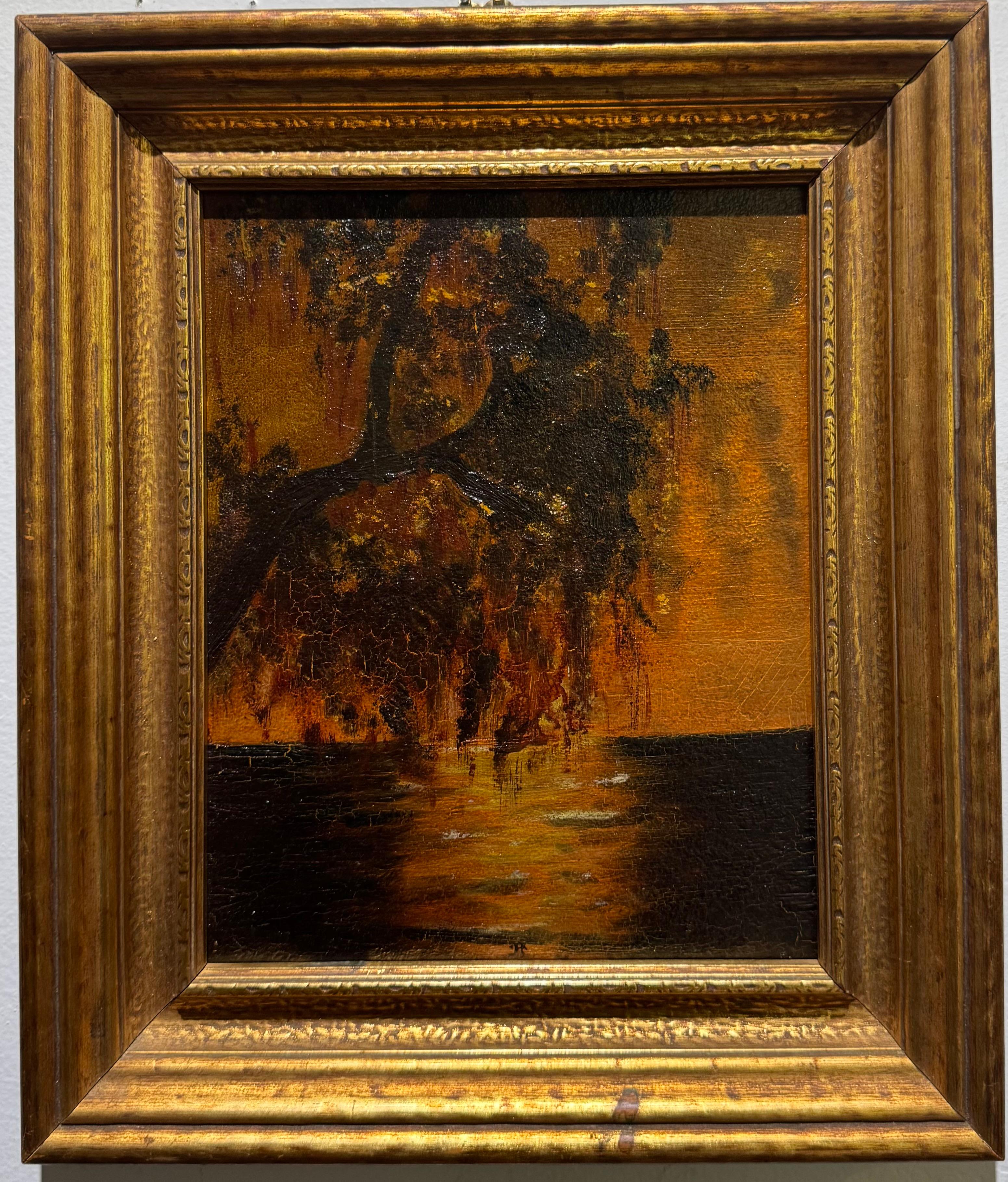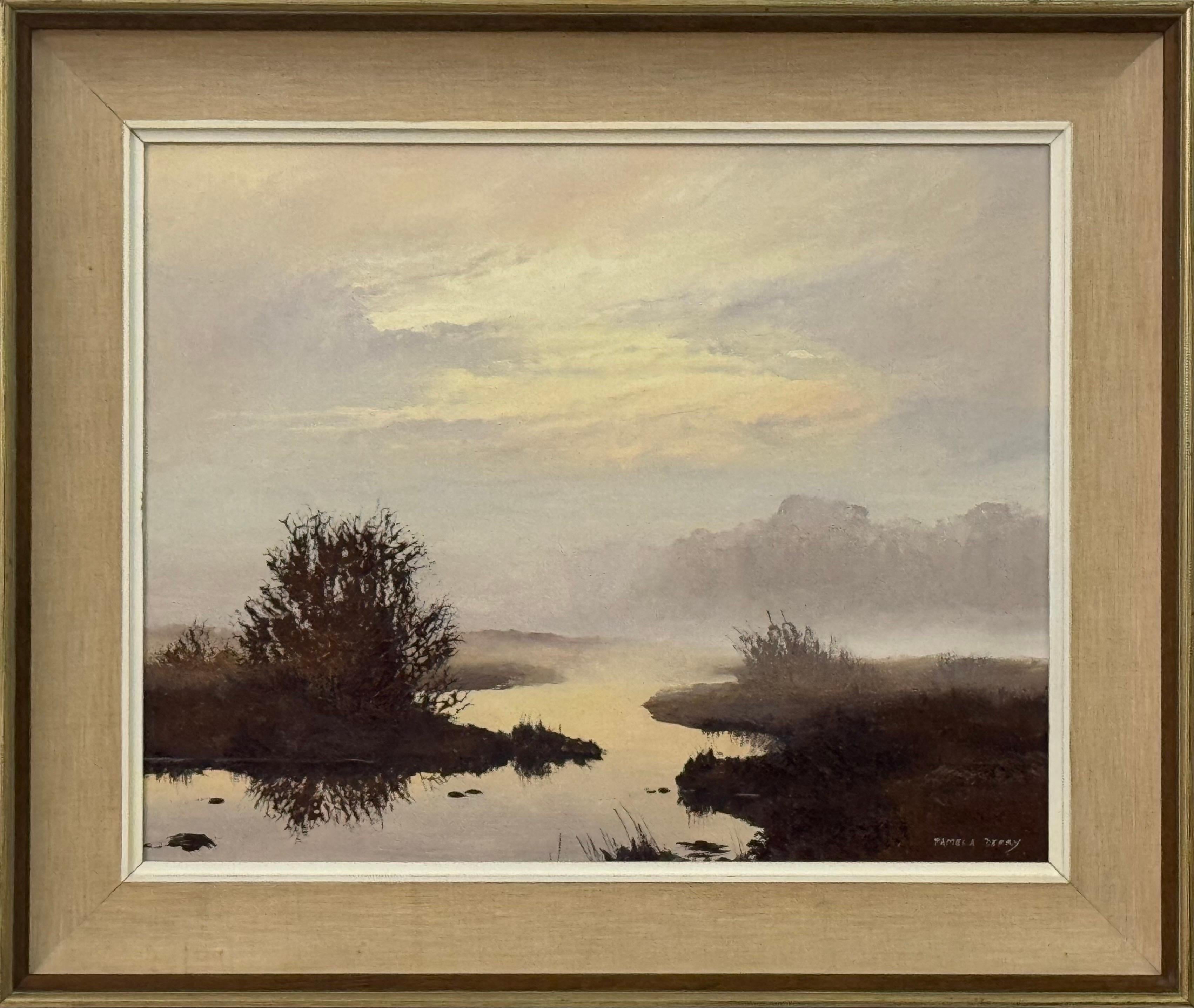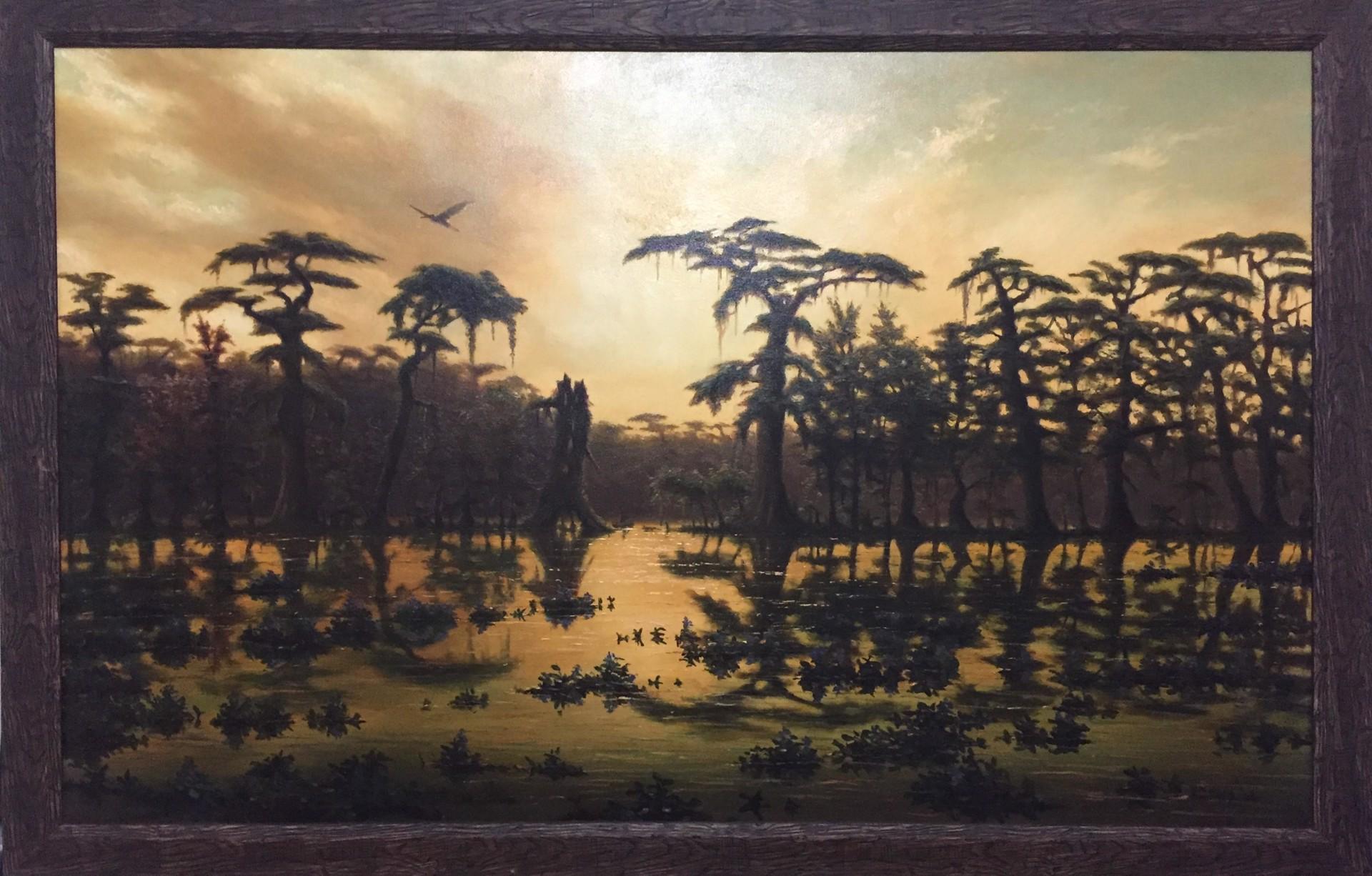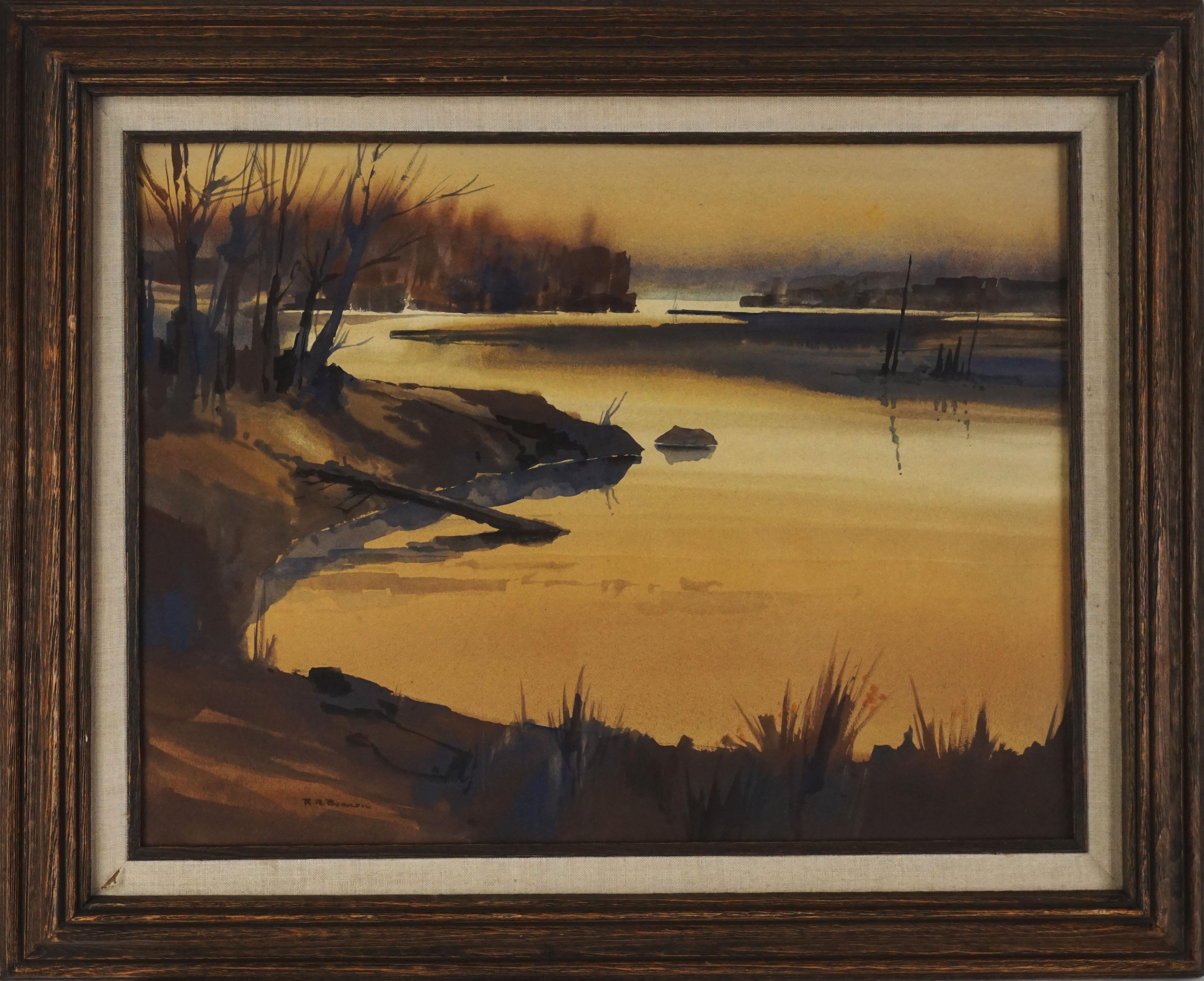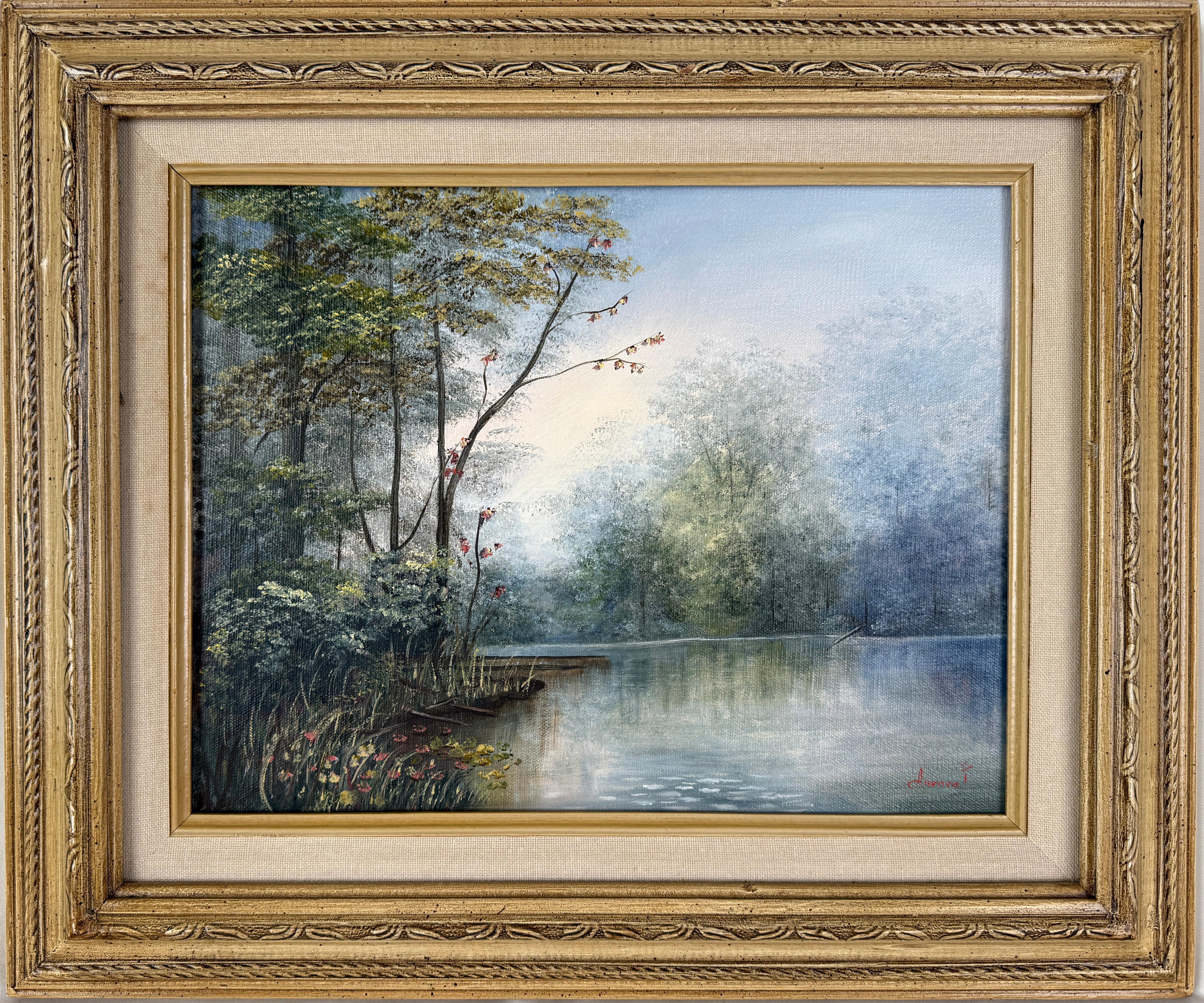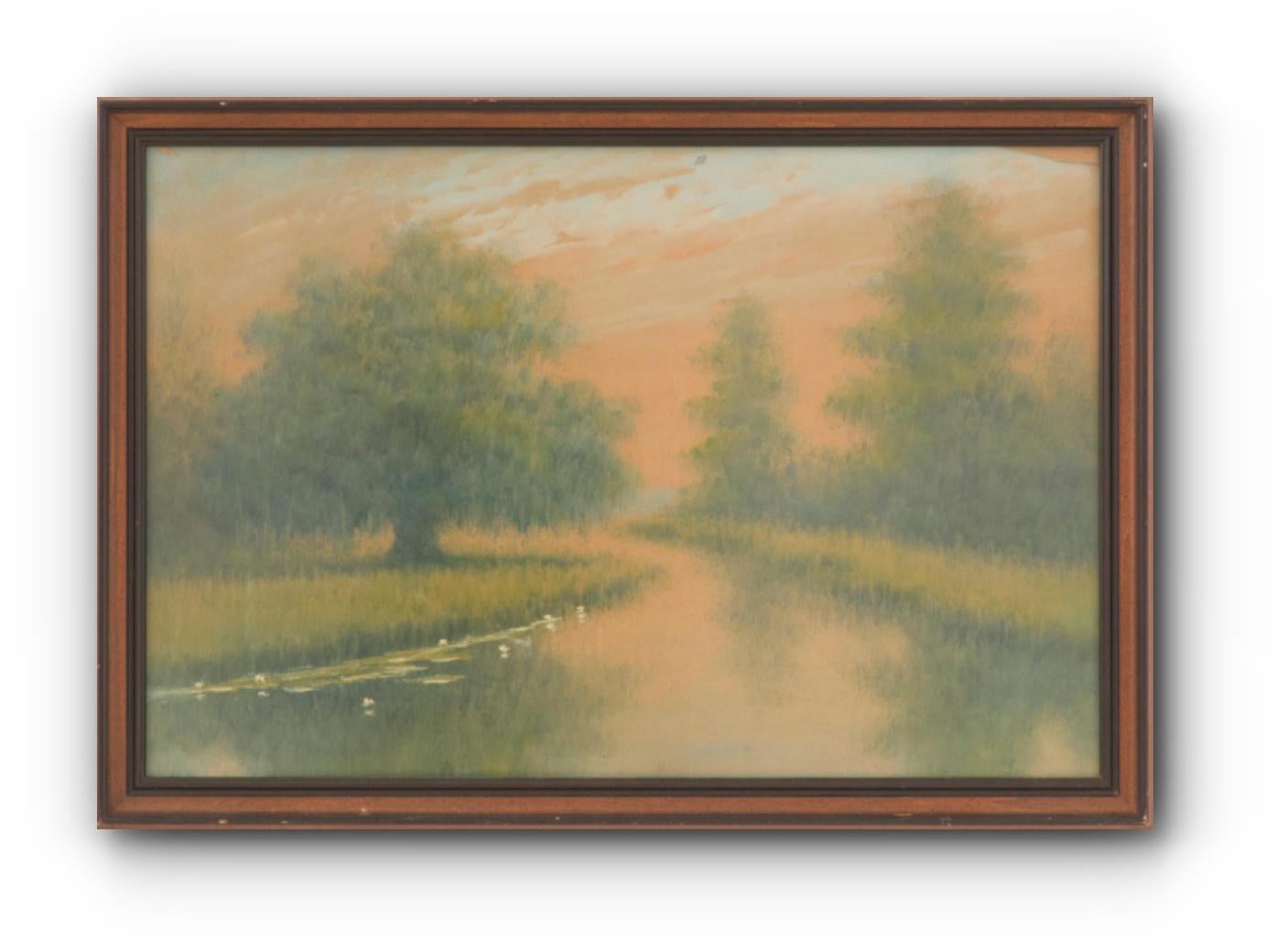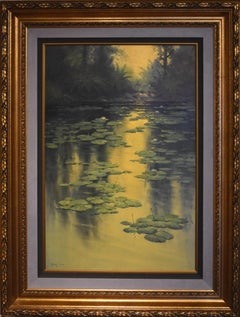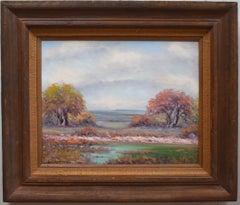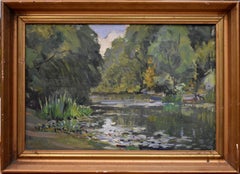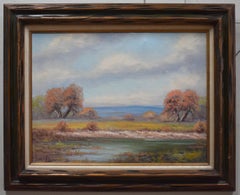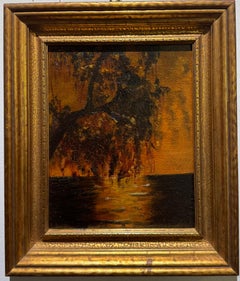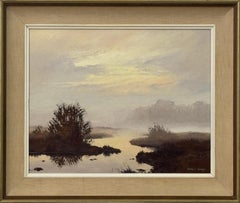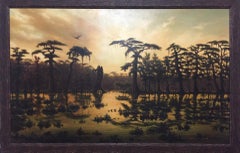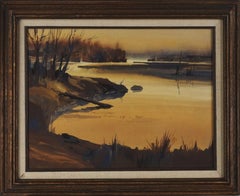Items Similar to "Misty Bayou" HAZE. ONE OF HIS BEST Dated 1917 Alexander Drysdale (1870-1934)
Want more images or videos?
Request additional images or videos from the seller
1 of 10
Alexander John Drysdale"Misty Bayou" HAZE. ONE OF HIS BEST Dated 1917 Alexander Drysdale (1870-1934)Dated 1917
Dated 1917
$24,000
£18,123.84
€20,750.13
CA$33,894.27
A$37,004.43
CHF 19,399.91
MX$449,433.09
NOK 242,273.30
SEK 228,770.59
DKK 154,877.62
About the Item
Alexander John Drysdale
(1870-1934)
New Orleans Louisiana / New York Artist
Size: 20 x 30
Frame: 26 x 36
Medium: Oil Wash? Watercolor?
Dated: 1917
"Misty Bayou" Housed in the original magnificent frame.
Alexander John Drysdale (1870-1934) New Orleans Louisiana / New York Artist
Alexander John (A.J.) Drysdale was an early 20th century Louisiana artist who specialized in landscapes using the technique of oil wash, that gave his works a characteristic of a hazy look. Drysdale made use of this technique by diluting the oil paint with kerosene and applying it with cotton balls. Alexander John Drysdale, born in Marietta, Georgia on March 2, 1870, came to New Orleans at the age of fifteen with his parents. His father, Reverend Alexander J. Drysdale, became the rector of Christ Church Cathedral. Alex received private tutoring from a Professor Mehado and art lessons from Ida Hackell at the Southern Art Union. Later in New Orleans (1887) he studied art under Paul Poincy (1833-1909). The exact date of Drysdale's arrival in New York is unknown, but he enrolled in the Art Students League where he received instruction from Charles C. Curran and Frank Vincent DuMond. Apparently, he remained in New York for about five years and did not go to Europe for further study. After some time, Drysdale began specializing in landscapes, executed in a tonalist manner.
Back in New Orleans, Drysdale was inspired by local subjects, especially swamp or bayou areas and other desolate wetlands. Over a period of many years Drysdale's landscapes evolved to a unique stylistic maturity. In 1909 he received a gold medal from the New Orleans Art Association. It is easy to see the influence of two artists that he admired: Corot and Inness. Working equally well in oil and watercolor (he also did scenes in charcoal), Drysdale usually divided his scene into halves or thirds, typically, a foreground consisting of tall swamp grasses achieved with broad vertical strokes; a middle ground consisting of a backdrop row of trees at the horizon line executed with staccato, jabbing strokes resulting in textural contrast; and a background devoted totally to a tonalist-like moisture-laden sky often hazy with no clouds or only a slight indication of them. This formulaic compositional format rendered with an economy of technique resulted in imagery with repetitious forms and shapes diffused in a nebulous space. In this regard, Drysdale's works are impressionistic; he also tended to use the violets and blues of the impressionist palette. Yet he lacked a specific interest in color and light. Although his expression of the Louisiana scenery is very personal, even mystical, the artist appears to have been very limited in subject matter. One of his last works was a mural for the Shushan (New York) Airport administration building, and shortly before his death he was employed as an artist by the Civil Works Administration.
Drysdale was a member of the Arts and Crafts Club of New Orleans, and his work was in the permanent collection of the Delgado Museum for many years. The artist worked at his studio at 320 Exchange Place in the picturesque Vieux Carré until his death at the age of sixty-three. Stewart (in Painting in the South, 1983), describes how Drysdale was a shrewd businessman. He would solicit new homeowners who might need a canvas to decorate a wall, or a cotton broker who recently made the headlines. Drysdale died in New Orleans, on February 9, 1934.
Sources:
Louisiana Artists from the Collection of Dr. and Mrs. James W. Nelson. Baton Rouge, LA: Louisiana State University, 1968; Wiesendanger, Martin and Margaret Wiesendanger, Nineteenth Century Louisiana Painters and Paintings from the Collection of W. E. Groves. New Orleans: W. E. Groves Gallery, 1971, pp. 44-45; Painting in the South: 1584-1980, Exh. cat. Richmond, VA: Virginia Museum, 1983, pp. 106-107, 114, 276; Chambers, Bruce W., Art and Artists of the South: The Robert P. Coggins Collection of American Paintings. Exh. cat. Rochester, NY: Memorial Art Gallery of the University of Rochester, 1984, p. 88; Zellman, Michael David, 300 Years of American Art. Seacacus, NJ: Wellfleet Press, 1987, p. 634; Gerdts, William H., Art across America: Two Centuries of Regional Painting, 1710-1920. New York: Abbeville Press, 1990, vol. 2, pp. 110-111.
Submitted by Richard H. Love and Michael Preston Worley, Ph.D.
Biography from The Johnson Collection
ALEXANDER JOHN DRYSDALE (1870–1934)
Born in Marietta, Georgia, Alexander John Drysdale was the only son of an ordained Episcopal priest whose ministry required frequent moves to parishes in Georgia, Alabama, and Tennessee. In 1883, he accepted the call to become dean of Christ Church Cathedral, New Orleans, and was later elected a bishop. Alexander, thirteen years old when the family settled in New Orleans, began his art studies under the instruction of Ida C. Haskell, a California-born artist who was on the faculty of the recently established Southern Art Union. The local academy had been founded by several leading artists, including Andres Molinary, William Henry Buck, Marshall J. Smith, and Paul Poincy. As early as 1889, Drysdale exhibited at the Artists’ Association of New Orleans, earning a reputation as a painter of “landscape scenes of the highest order.” All the while—and especially after the unexpected death of his father—Drysdale worked as a bookkeeper and banker to support his widowed mother and sisters. Buoyed by his success in local exhibitions, Drysdale, now thirty-one years old, left Louisiana in 1901 to pursue advanced art studies in New York City.
Enrolling at the Art Students League, Drysdale took classes from esteemed artists—including Charles Courtney Curran and Frank Vincent DuMond—and was exposed to the Impressionist aesthetic of William Merritt Chase. During his three years in New York, he continued to submit work to exhibitions in New Orleans. He also befriended fellow pupil Helen Turner, whose career would far eclipse his own. Drysdale returned to New Orleans in 1903 and opened a studio, initially advertising himself as a portrait painter, though landscapes remained his subject of choice. In 1909, he was awarded a gold medal by the Artists’ Association, securing his place in the local art scene.
Drysdale’s personal expression as an artist spring from his creation of a highly idiosyncratic medium. He thinned oil paints with kerosene to create a wash—not unlike watercolor—which he applied to a very porous artist board. In a tactic that surely increased his productivity, he employed not only a brush, but also used cotton balls dipped in the color wash as a tool for daubing pigment onto the surface. Kerosene has a rapid evaporation factor which, combined with the viscosity of its petroleum base, gave these works precisely that moist and humid glow he sought to express the light and environment of the Louisiana bayous. Having developed and perfected this trademark technique, Drysdale was prolific. Some accounts estimate that he created ten thousand works of art over the course of his career, paintings once described as “misty blue and green landscapes seen through tears or soft rainfall.”
The Johnson Collection, Spartanburg, South Carolina
- Creator:Alexander John Drysdale (1870 - 1934, American)
- Creation Year:Dated 1917
- Dimensions:Height: 20 in (50.8 cm)Width: 30 in (76.2 cm)Depth: 3 in (7.62 cm)
- More Editions & Sizes:Size: 20 x 30 Frame: 26 x 36Price: $24,000
- Medium:
- Movement & Style:
- Period:
- Framing:Frame IncludedFraming Options Available
- Condition:Painting is very, very nice. Original fabulous frame has a few minor imperfections. Wouldn't you if you were born in 1917? Please check our other items for fine: Texas, Western & American Art.
- Gallery Location:San Antonio, TX
- Reference Number:1stDibs: LU769314545332
About the Seller
5.0
Vetted Professional Seller
Every seller passes strict standards for authenticity and reliability
Established in 1974
1stDibs seller since 2017
102 sales on 1stDibs
Typical response time: 1 hour
- ShippingRetrieving quote...Shipping from: Fredericksburg, TX
- Return Policy
Authenticity Guarantee
In the unlikely event there’s an issue with an item’s authenticity, contact us within 1 year for a full refund. DetailsMoney-Back Guarantee
If your item is not as described, is damaged in transit, or does not arrive, contact us within 7 days for a full refund. Details24-Hour Cancellation
You have a 24-hour grace period in which to reconsider your purchase, with no questions asked.Vetted Professional Sellers
Our world-class sellers must adhere to strict standards for service and quality, maintaining the integrity of our listings.Price-Match Guarantee
If you find that a seller listed the same item for a lower price elsewhere, we’ll match it.Trusted Global Delivery
Our best-in-class carrier network provides specialized shipping options worldwide, including custom delivery.More From This Seller
View All"THE LILY PADS" G. HARVEY LANDSCAPE 1980 TEXAS ARTIST SERENE GREENS & YELLOWS
By G. Harvey
Located in San Antonio, TX
G. Harvey (Gerald Harvey Jones)
(1933-2017)
San Antonio, Austin, and Fredericksburg Artist
Image Size: 36 x 24
Frame Size: 50 x 37.5
Medium: Oil
Dated 1980
"The Lily Pads"
G. Harvey,...
Category
1980s Impressionist Landscape Paintings
Materials
Oil
"LONG VIEW" TEXAS LAKES AND COUNTRYSIDE FRAMED 24.75 X 28.75 Texas Hill Country
By Pedro Lazcano
Located in San Antonio, TX
Pedro Lazcano
(1909-1970)
San Antonio Artist
Image Size: 16 x 20
Frame Size: 24.75 x 28.75
Medium: Oil
"Long View" Texas Hill Country
Pedro Lazcano (1909-1970)
I was always curious a...
Category
1960s Impressionist Landscape Paintings
Materials
Oil
"LILY PADS" DATED 1912. SAN ANTONIO RIVER. OLIVE BRACK (1890-1957)
Located in San Antonio, TX
Olive Brack San Antonio River
(1890-1957)
San Antonio, TX
Image Size: 12 x 18
Frame Size: 15.5 x 21.5
Medium: Oil on Canvas
Dated 1912
"Lilly Pads"
Biogra...
Category
1910s Impressionist Landscape Paintings
Materials
Oil
"WATERING HOLE" TEXAS 25.5 X 31.5
By Pedro Lazcano
Located in San Antonio, TX
Pedro Lazcano
(1909-1970)
San Antonio Artist
Image Size: 18 x 24
Frame Size: 25.5 x 31.5
Medium: Oil
"Watering Hole"
Pedro Lazcano (1909-1970)
I was always curious about Pedro Lazcan...
Category
1960s Impressionist Landscape Paintings
Materials
Oil
"TEXAS SUMMER" HILL COUNTRY CIRCA 1930'S 1872-1957 COMFORT ARTIST
Located in San Antonio, TX
P. L. Hohnstedt (Peter Lanz)
(1872 - 1957)
San Antonio, Comfort Artist
Image Size: 12 x 16
Medium: Oil
Circa 1930s
"Texas Summer" Hill Country
Biography
P. L. Hohnstedt (Peter Lanz) ...
Category
1930s Impressionist Landscape Paintings
Materials
Oil
"OLD PATH HOME" TEXAS LANDSCAPE CIRCA 194Os HEAVEY IMPASTO.
Located in San Antonio, TX
E.G. Edward Eisenlohr
(1872 - 1961)
Dallas Artist
Image Size: 11 x 14
Frame Size: 14 x 18
Medium: Oil
"Old Path Home"
Biography
E.G. Edward Eisenlohr (1872 - 1961)
Edward Gustav Eise...
Category
20th Century Impressionist Landscape Paintings
Materials
Oil
You May Also Like
Antique American Sunrise TONALIST Southern GULF IN TEXAS oil painting
Located in New York, NY
Lily Ayres (died 1936)
Circa 1910
“Sunrise Gulf in Texas”
Monogrammed
Oil on Board
8x10 inches unframed
12x14 inches with frame
Original frame with Labels verso
Lily Ayres is an ex...
Category
Early 1900s Barbizon School Landscape Paintings
Materials
Oil
Misty marshland painting with golden dawn, serene reflections, and soft hues
Located in Preston, GB
Misty marshland painting with golden dawn, serene reflections, and soft hues by 20th Century British Artist, Pamela Derry (1932-2002)
Art measures...
Category
20th Century English School Landscape Paintings
Materials
Oil, Board
$1,598 Sale Price
20% Off
Louisiana Swamplands (Contemporary Original Oil Painting, Framed)
Located in New Orleans, LA
All I have ever seen of this Amite, Louisiana painter’s depictions of Louisiana swamplands is in the form of prints and reproductions. So I actually had to call him to learn how to p...
Category
21st Century and Contemporary Impressionist Landscape Paintings
Materials
Oil
"Misty Lagoon", Monochrome 1970's Lanscape Watercolor
By Ritchie A. Benson
Located in Soquel, CA
A gorgeous American Impressionist watercolor painting of a serene lagoon in a brown/orange monochrome palette by Ritchie Allen Benson (American, 1914-1991). Titled "Misty Lagoon." Presented in a wood frame. Signed "R. A. Benson" lower left. Framed size: 25"H x 31"W. Image: 23.5"W x 17.5"H.
Ritchie A. Benson grew up in the Los Angeles area during the World War 11 era. By the late 1950s, he was studying watercolor painting and by the 1960s was exhibiting on a national level. He spent a great deal of time painting along the California coast and was most interested in producing works which pictured boats and harbor scenes.
His watercolors were sold through the Challis Gallery in Laguna Beach and through art association exhibition sales. Although he continued to paint occasionally in Southern California, most of Bensen's later works were done in Mendocino, California, or farther north in Washington state where he spent a lot of time painting on the beaches...
Category
Mid-20th Century American Impressionist Landscape Paintings
Materials
Paper, Watercolor, Board
$1,720 Sale Price
20% Off
Misty Pond in San Antonio Texas Original Oil on Canvas
Located in Soquel, CA
Misty Pond in San Antonio Texas Original Oil on Canvas
Flowers by a pond by Texas artist Aurora "Ora" V. Hererra (American, 1928-2008). The painting de...
Category
1980s American Impressionist Landscape Paintings
Materials
Oil, Stretcher Bars, Canvas
$500 Sale Price
20% Off
Alexander Drysdale, Live Oak and Cypress Trees - Provenance - Framed
By Alexander Drysdale
Located in New Orleans, LA
A classic Alexander Drysdale bayou scene, with the characteristic orangey/peach Impressionistic glow, out of the estate of Kenneth Abshire of Gulfport, MS. If you clicked on this, yo...
Category
1910s Impressionist Landscape Drawings and Watercolors
Materials
Oil
More Ways To Browse
New Arrivals
Alexander John
Bayou Painting
Alexander Drysdale
William Marshall
Charles C Curran
Margaret Martin
Picnic Oil Painting
Still Life Oil Painting Valuable
Texas Hill Country Painting
Antique Plough
Bath House
Berkeley Painting
Canadian Art Quebec
Cote Oil Painting
Covered Bridge
Edmund Tarbell
Hart Oil Paintings
